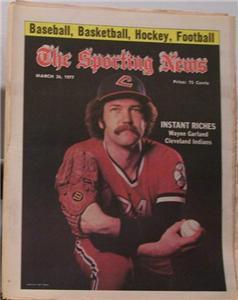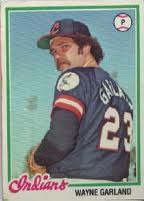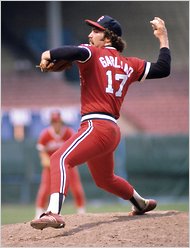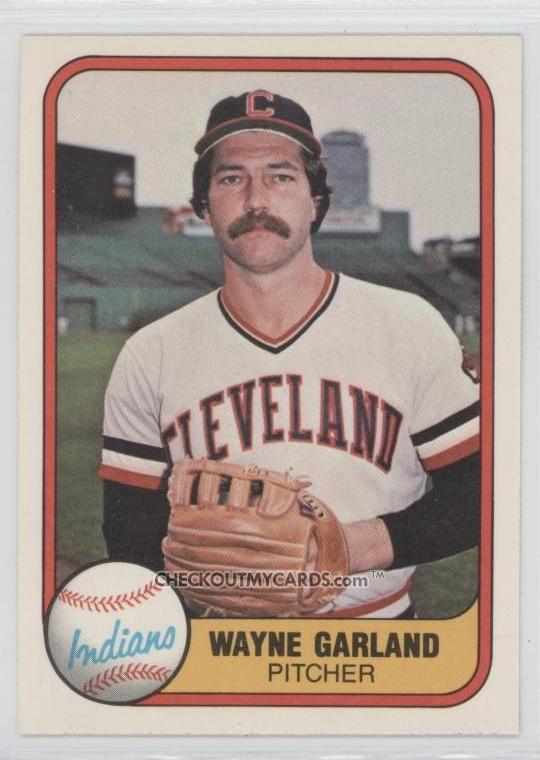 Indians Archive
Indians Archive  Blast From The Past: Wayne Garland, Baseball's First Star Free Agent
Blast From The Past: Wayne Garland, Baseball's First Star Free Agent
 On that August day in 1977, the teenage boys spent much of the pregame wandering around the mammoth old stadium. They made their way down to the box seats behind home plate. After taking a look around, they would return to their cheap seats in the upper deck. There, they would spell out messages by strategically folding down empty seats (eg. “BEEG MON”, as a salute to Rico Carty). They could also spread out and slam the adjacent seats in rhythm along with John Adams, who in year four was already a fixture out in the bleachers pounding his bass drum. The area behind home plate was pretty crowded and active that day, and cascading all around the boys were loud, booming BOOOOOOOOs.
On that August day in 1977, the teenage boys spent much of the pregame wandering around the mammoth old stadium. They made their way down to the box seats behind home plate. After taking a look around, they would return to their cheap seats in the upper deck. There, they would spell out messages by strategically folding down empty seats (eg. “BEEG MON”, as a salute to Rico Carty). They could also spread out and slam the adjacent seats in rhythm along with John Adams, who in year four was already a fixture out in the bleachers pounding his bass drum. The area behind home plate was pretty crowded and active that day, and cascading all around the boys were loud, booming BOOOOOOOOs.
It was startling, and a little oppressive. Pretty quickly, they understood the booing to be directed at Wayne Garland, who was beginning his PREGAME WARMUP, pitching from the mound. We Cleveland fans sure are passionate, whether we love you or hate you.
Garland had been taken with the 5th pick in the 1969 amateur draft by the Baltimore Orioles. From 1973 to 1975, he developed into a starter under manager Earl Weaver, and in 1976, Garland had a huge year for the O's. He went 20-7 and sported a 2.67 ERA over 232 innings. He was known throughout Baseball as a hard-throwing righty who had the poise of an ace. Garland did not nibble around the strike zone; he came right at the hitter.
Back in 1974, Major League Baseball had seen Catfish Hunter enter free agency. It occurred when A's owner Charlie O. Finley breached his contract by not honoring a contract requirement to fund an annuity for him. MLB Players Association executive director Marvin Miller saw how teams lined up at Hunter's door to bid for his next contract. Miller eventually wanted to fully test free agency, and by 1975 pitchers Andy Messersmith and Dave McNally provided the test cases he wanted. These unsigned players were willing to be bid upon by teams other than the ones they'd been with. The team owners held that the reserve clause meant the unsigned players remained the property of the teams with whom they'd previously had contracts. Their cases went to arbitrator Peter Seitz, and when the owners refused to budge or even negotiate on the reserve clause, Seitz declared Messersmith and McNally full free agents. The floodgates were opening.
After Wayne Garland's dominant 1976 season, his contract expired. He became the very first star free agent in baseball history (McNally was well past his prime by the time he became a free agent, and Messersmith wasn‘t really a star). The Cleveland Indians, a franchise noted for a lack of 1) capital, 2) talent evaluation, 3) player development and 4) attendance, signed Garland to a very high-profile, 10 year, $2.3million contract.
The Tribe was coming off Frank Robinson’s historical season as Baseball’s first black manager. He'd provided additional excitement as a hitter as well. The year ended with the team at 81-78, a rare year over .500. The Tribe brass apparently thought the timing was right to make a splash, and they won the bidding for Garland despite being awash in financial losses going back to at least 1972.
 Unbeknownst to others at the time, Garland suffered a shoulder injury during his first season with the Indians, in 1977. Later, it would be diagnosed as a torn rotator cuff. Garland played through the injury, trying to earn his contract. He pitched 282 innings- 50 more than in his previous, dominant year. He pitched 21 complete games! However, he often was hammered by the opposition throughout his first season with the Tribe. There were factors which compounded Garland's predicament as well. One factor was his uniform number, 23, which was a constant, unfortunate reminder of his $2.3million contract, of which fans felt he wasn't worthy (he soon changed it to #17, which he'd worn with Baltimore). Another factor was Garland's demeanor, which was constantly sullen. He never seemed to smile. This surely worked against him in the court of public opinion.
Unbeknownst to others at the time, Garland suffered a shoulder injury during his first season with the Indians, in 1977. Later, it would be diagnosed as a torn rotator cuff. Garland played through the injury, trying to earn his contract. He pitched 282 innings- 50 more than in his previous, dominant year. He pitched 21 complete games! However, he often was hammered by the opposition throughout his first season with the Tribe. There were factors which compounded Garland's predicament as well. One factor was his uniform number, 23, which was a constant, unfortunate reminder of his $2.3million contract, of which fans felt he wasn't worthy (he soon changed it to #17, which he'd worn with Baltimore). Another factor was Garland's demeanor, which was constantly sullen. He never seemed to smile. This surely worked against him in the court of public opinion.
 Wayne Garland pitched valiantly in 1977, but was largely ineffective and unappreciated. The team finished 71-90, and Frank Robinson was fired as the team openly questioned his leadership. Garland came back in 1978, again tried to pitch through pain, and finally underwent surgery in May. His rehab should have consisted of a year of healing and a second year of strength-building. Instead, he began pitching again in 1979- ten months after his surgery. This was a huge mistake: it guaranteed he would never again pitch effectively. His comeback attempts ended in 1981, when he went 3-7, and he was released at the end of the season.
Wayne Garland pitched valiantly in 1977, but was largely ineffective and unappreciated. The team finished 71-90, and Frank Robinson was fired as the team openly questioned his leadership. Garland came back in 1978, again tried to pitch through pain, and finally underwent surgery in May. His rehab should have consisted of a year of healing and a second year of strength-building. Instead, he began pitching again in 1979- ten months after his surgery. This was a huge mistake: it guaranteed he would never again pitch effectively. His comeback attempts ended in 1981, when he went 3-7, and he was released at the end of the season.
(Surprising note: The Neyer/James Guide to Pitchers cites The Sporting News (7/5/80, Bob Sudyk) as listing Garland's pitching assortment as 1. Curveball, 2. Slider, 3. Screwball, 4. Fastball, and 5. Knuckleball, in that order. Showing the fastball as # 4 surely refers to the post-1976 Garland, as does the curious knuckleball reference- which I did not find with any other source.)

Years later, in retirement, Garland insisted that he tried his hardest to live up to the expectations created by his unheard-of contract. He agreed he wasn’t worth the money- but it was the team who’d offered it. He didn’t force them to. Actually, salaries were soon being signed which far surpassed Garland’s (within six years, George Foster was the first player to sign a contract which paid $2million per season). But the fans weren’t the only ones impatient with the pitcher. Tribe brass such as Phil Seghi and Gabe Paul were direct with Garland: he needed to ‘earn’ that money.
On that August day back in 1977, Buddy Bell homered in a 12-4 romp over the Milwaukee Brewers (I loved that Cleveland lineup- they could score runs). Garland overpowered the Brewers with a complete game victory. The crowd roared its approval. It was brief glimpse of the pitcher the Tribe thought they'd signed with the first star free-agent contract in MLB history.
Thank you for reading. Next week: Blast From The Past: "Sudden Sam" McDowell.
- NBA Announces 2013-2014 Schedule
- Browns Ink Sharknado
- Sharknado A No-Show For Rookie Camp
- Trent Richardson Out Until Training Camp
- Browns Sign Brandon Jackson
- Carrasco Suspended Eight Games
- Browns Add to Wide Receiver Depth with David Nelson
- Browns Need to Learn from Past Draft Mistakes
- Browns Release Chris Gocong and Usama Young
- Browns Missing on Grimes Disappointing, But Not The End
The TCF Forums
- Chris Grant's first 3 drafts
Kingpin74 (Tuesday, January 21 2014 10:13 AM) - The 2014 Offseason Thread
googleeph2 (Tuesday, January 21 2014 9:36 AM) - 2015 Recruiting
furls (Tuesday, January 21 2014 6:57 AM) - Mike Brown
YahooFanChicago (Monday, January 20 2014 11:15 PM) - Movies coming out
HoodooMan (Monday, January 20 2014 9:34 PM) - 2014 Hoops Hockey Hijinx
jpd1224 (Monday, January 20 2014 4:44 PM) - 2014 Recruiting
jclvd_23 (Monday, January 20 2014 2:26 PM) - Wish List - #4 Pick
Hikohadon (Monday, January 20 2014 1:26 PM) - Official- Browns Coach Search/Rumors
OldDawg (Sunday, January 19 2014 6:48 PM) - #1 overall pick Anthony Bennett
TouchEmAllTime (Sunday, January 19 2014 1:28 PM)


